Pope Francis

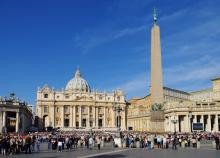
The special committee of eight cardinals created by Pope Francis with the goal of dramatically reforming the Vatican’s governance got off to an “encouraging” start, the Vatican’s chief spokesman said Wednesday, with a warning not to expect regular updates.
The Rev. Federico Lombardi said Francis met with the so-called Gang of Eight, or the Vatican G-8, on Tuesday and Wednesday to seek their counsel on possible reforms ranging from pastoral work with families and the role of the laity to the prickly issue of tackling the Vatican bureaucracy.
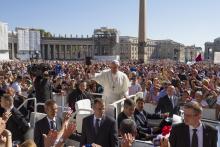
Pope Francis has once again given a startlingly candid interview that reinforces his vision of a Catholic Church that engages the world and helps the poor rather than pursuing culture wars, and one “that is not just top-down but also horizontal.”
The pope’s conversation with Eugenio Scalfari, an atheist and well-known editor of the Italian newspaper La Repubblica, took place at the pope’s residence in the Vatican guesthouse on Sept. 24 and was published on Tuesday.
His newest bombshell come just two weeks after the publication of the pope’s lengthy, groundbreaking interview with a Jesuit journalist in which Francis said the church was “obsessed” with a few moral issues, like abortion and homosexuality, and needed an “attitude” adjustment if it hopes to strike a “new balance” in its approach to the wider world.
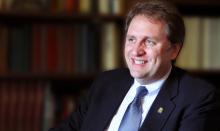
Christians and Jews are mounting campaigns for and against a path to sainthood for British writer G.K. Chesterton (1874-1936), one of the world’s best-known Catholic converts.
Roman Catholic Bishop Peter Doyle of Northampton, where Chesterton lived and worked, has ordered an examination of Chesterton’s life — the first step in what is likely to be a long and unpredictable process toward canonization.
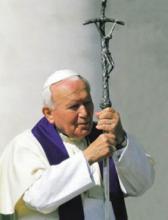
Popes John Paul II and John XXIII will be formally declared saints on April 27, 2014, the Vatican said Monday. Pope Francis made the announcement during a meeting with cardinals gathered in Rome.
John Paul, who was pope from 1978 to 2005, and John, who reigned from 1958 to 1963, are considered two of the most influential religious leaders in the world in the last century, and they represent two poles in Roman Catholicism — John XXIII is a hero to liberals, while John Paul II is widely hailed by conservatives.

Are the media pulling their punches when it comes to Pope Francis?
Whether it’s because he carries his own bags or cold-calls troubled Catholics who write to him, or because he so clearly loves interacting with crowds or drives a beat-up Renault around the Vatican, it’s hard to tell. But at some point, much of the world’s media fell for the new pope.
Now an increasing number of Vatican insiders are asking whether the largely positive view of Francis affects the way the media cover the Holy See.
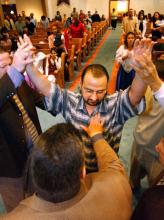
A new survey of Hispanic political and religious values finds they’re overwhelmingly Democrats who hold a largely negative view of the Republican Party.
The 2013 Hispanic Values Survey of 1,563 Hispanic adults was conducted online in both English and Spanish between Aug. 23 and Sept. 3. It has a margin of error of plus or minus 3.7 percentage points.
The survey found that most Hispanics are delighted with Argentine-born Pope Francis, but they hold slightly less favorable views of the Catholic Church. While nearly 69 percent look favorably on the pope, only 54 percent see the institution in a favorable light.
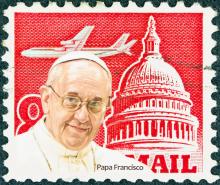
Suddenly, unexpectedly, and almost miraculously, the values of simplicity, humility, welcome, and the priority of the poor have burst on to the international stage. A new pope named Francis is reminding us that love is also a verb — choosing the name Francis because of his commitment to the poor, to peace, and creation in sharp contrast to the values of Washington, D.C.
Last week the House of Representatives voted to cut food stamps. The previous week marked the 5th anniversary of the financial collapse, and showed more American inequality than before the recession. And now we face a threatened shutdown of the government unless the health care promised to tens of millions of uninsured people is repealed.
Pondering all that, I saw the interview with Pope Francis in America magazine and his profile in the new issue of Sojourners. And from every direction, things that the new pope was saying were breaking through the political news cycle. Even my students at Georgetown were telling me that their young friends, Christians or not, were putting Francis quotes up on their Facebook pages.
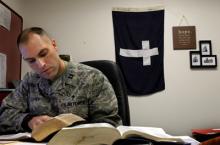
Catholic military chaplains cannot be forced to witness or bless a same-sex marriage, nor are they allowed to take part in any marriage counseling retreats that are open to gay couples under new rules issued by the Archdiocese for the Military Services.
The rules, sent to chaplains on Sept. 18 by Archbishop Timothy P. Broglio, head of the AMS, also bar chaplains from taking part in a funeral for a Catholic if that participation “would give the impression that the church approves of same sex ‘marital’ relationships.”
But the new rules also set out conditions that would allow Catholic military commanders to comply, without violating their beliefs, with rules giving same-sex couples under their command federal employee benefits as required by law.
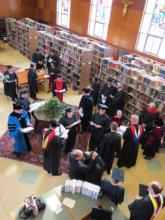
After decades of glum trends — fewer priests, fewer parishes — the Catholic Church in the United States has a new statistic to cheer: More men are now enrolled in graduate-level seminaries, the main pipeline to the priesthood, than in nearly two decades.
This year’s tally of 3,694 graduate theology students represents a 16 percent increase since 1995 and a 10 percent jump since 2005, according to Georgetown University’s Center for Applied Research in the Apostolate (CARA).
Seminary directors cite more encouragement from bishops and parishes, the draw of Pope Emeritus Benedict XVI and the social-justice-minded Pope Francis, and a growing sense that the church is past the corrosive impact of the sexual abuse crisis that exploded in 2002.

Angélique Namaika, a Roman Catholic nun, rides a bicycle on the rutted roads of the Democratic Republic of Congo’s northeastern province of Orientale, which is plagued by rebel violence.
On these same roads, the Lord’s Resistance Army, a Christian rebel group led by Joseph Kony, a self-proclaimed prophet of God, has been killing, abducting, and mutilating women and children.
But none of that has deterred Sister Namaika from helping displaced women learn trades, start small businesses, and go to school.

A straggle of kids came up for children’s time at Poland Presbyterian Church, a 211-year-old congregation established on Lot One, in Township One, in Range One of what was once known as the Connecticut Western Reserve.
The church’s education minister asked them to do this year’s CROP Walk in nearby Youngstown. Two miles, five miles, whatever they can do to raise money for alleviating hunger.
“Seventeen million children will go to bed hungry in America tonight,” she explained.

Pope Francis criticized what he called the “idolatry of money” on Sunday in a trip to one of the poorest regions of the European Union.
The pontiff, visiting the island of Sardinia off Italy’s western coast, departed from his prepared remarks to talk about his own family’s struggles as Italian immigrants in Argentina. Speaking on an island where more than half of workers under 30 are unemployed, Francis told the masses: “Don’t let yourselves be robbed of hope.”
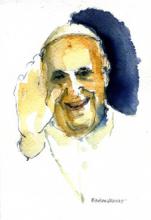
Pope Francis’ comments last week on everything from gays to abortion (less talk, more mercy), the hierarchy (be pastors, not bureaucrats), and religious faith (doubt is part of belief) continue to reverberate through the church and the media.
Here are five broader insights that this wide-ranging interview revealed about Francis — and why they will be keys to reading his pontificate, and perhaps the future of Catholicism.

Like most of the world last spring, I watched in fascination as Jorge Mario Bergoglio was elected pope. The first day, I was non-plussed. Another old, white guy? Big surprise. The second day, I began to take notice: he was a Jesuit and he chose the name Francis, the first pope ever to do so. The third day, I got a little discouraged as Catholic pundits and news organizations across the nation scrambled to prop up his conservative credentials and hardline stances. But as the week unfolded, I heard the stories of how he paid his own bills, carried his own bags, and rode in a modest sedan across town and my heart melted a little bit. Then came his ordination, and in one simple gesture, stopping to cradle a disabled man in his arms, he captured my imagination. I was willing to entertain the possibility that he just might be a different kind of pope.

The message of Christ is not often so clearly presented in American media as it was yesterday, nor is that message as clearly contradicted in the same news cycle.
Yesterday, Pope Francis, while not actually changing any doctrinal stance of the Catholic church, clearly asserted in a rare and frank interview that compassion and mercy must be the light that radiates from the global church for the world to see, rather than the church’s current “obsession” with gays, birth control, and abortion.
At the same time that the pope’s words were cycling through the media, other words were also coming through loud and clear: those of Republican lawmakers who have decided that the least of these will remain just that and, accordingly, voted to slash the food stamp budget by almost $40 billion.
The juxtaposition presented between these two events is striking. It also represents an enormous divide among Christians, and, frankly, demonstrates why so many feel Christianity is a religion full of hypocrisy.
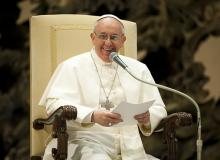
Pope Francis on Thursday rocked the Catholic Church and surprised the wider world with a free-ranging interview that charted a course away from an institution that’s “obsessed” with a few sexual and moral issues and toward one that is more pastoral, less clerical and less doctrinaire.
But amid the widespread praise for his remarks – “Catholic is the new cool,” tweeted National Journal’s Ron Fournier – and some pointed criticism from the pontiff’s right flank, there lurks a critical, unanswered question: Can Francis make his vision for the church a reality?
More than detailing a list of reforms or policy change he hopes to make — which may yet happen, after time and extensive deliberations — the pope was sketching out a pastoral vision for the church, and modeling a way for clergy to speak and relate to their flocks.
In order to replicate that model, Francis needs enough time to appoint bishops who share his views and who can in turn encourage and promote like-minded priests and seminarians. In many ways, the type of change Francis envisions will take a generation or more.
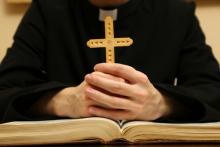
It’s not every day you meet a practicing priest in the Catholic Church who is married, so when I got in touch with Fr. Dwight Longenecker (a man who meets the above criteria), I took the opportunity to get his take on sex, marriage, celibacy, and how the Church can, should, and already is dealing with sex differently, both within clergy circles and beyond them.
Dwight Longenecker was brought up in an evangelical home and graduated from the stridently anti-Catholic Bob Jones University in Greenville, S.C. While there he became an Anglican and went on to study theology at Oxford University. He married Alison and they have four children. After 10 years as a minister in the Church of England Dwight and his family converted to the Catholic faith. Showing that God has a sense of humor, Dwight returned to Greenville to be ordained as a Catholic priest. He now serves as a parish priest in Greenville.
You are both married and a Catholic Priest. How did that happen?
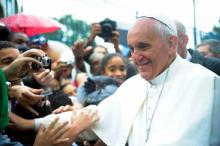
Wading into ongoing debates over religion and politics, Pope Francis on Sunday gently chided Christians to pray for politicians, saying “a Christian who does not pray for his leaders is not a good Christian.”
The pope’s remarks during a two-hour closed-door meeting of Roman clergy did not touch on more controversial issues like the separation between church and state, abortion, or refusing Communion to Catholic politicians who are not in sync with church teachings.
Instead, Francis quoted St. Paul, who urged prayer “for kings and all who are in high positions, that we may lead a peaceful and quiet life.”
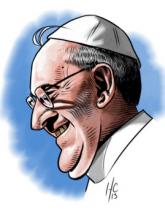
When I see him smiling on TV or on the cover of a magazine in the checkout line at the grocery store, I get the warm fuzzies.
I follow him religiously on Twitter and have a Google news alert set up so I don’t miss a morsel of his latest awesomeness.
The photo meme of him smiling gape-mouthed at a little girl accompanied by the words, “You love Jesus too?!” is my screensaver, and I wear a pendant with a tiny image of him on one side and of St. Francis on the other.
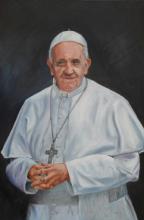
Pope Francis’ friendly letter to atheists, published this week by Italy’s La Repubblica newspaper, has been cheered by Catholics who welcomed another sign of the pontiff’s new openness to the world beyond the Vatican walls.
But it has also prompted some gnashing of teeth among others, who are reacting to headlines about the pope’s letter like this one in the British newspaper The Independent:
“Pope Francis assures atheists: You don’t have to believe in God to go to heaven.”